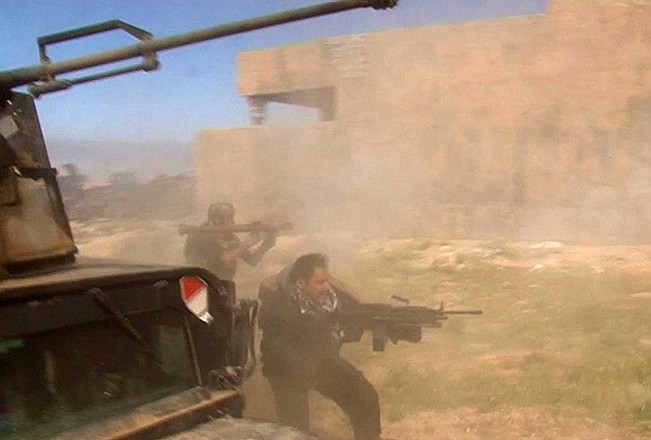BAGHDAD (AP) - Iraqi soldiers and allied Shiite militiamen swept into the Islamic State-held city of Tikrit on Wednesday, launching a two-front offensive to squeeze extremists out of Saddam Hussein's hometown in a major test of the troops' resolve.
Explosions and heavy gunfire echoed through Tikrit, a key way station for Iraqi forces trying to expel the militants who hold roughly a third of the country and neighboring Syria. The offensive also will serve as a major crucible for Iraqi forces, which collapsed under the extremists' initial offensive last year and now face street-by-street fighting in one of the Islamic State group's biggest strongholds.
Allied Iraqi forces first entered the city through its northern Qadisiyya neighborhood, according to video obtained by the Associated Press. Overhead, an attack helicopter fired missiles as soldiers and militiamen laid down heavy machine gunfire in the neighborhood's dusty streets as downtown Tikrit loomed in the distance, black smoke rising overhead.
Officials quickly established a supply line through the neighborhood to reinforce troops, Salahuddin police Brig. Kheyon Rasheed told the state-run Iraqiyya television. Authorities offered no immediate casualty figures, though Iran's state-run Press TV satellite channel reported that a mortar attack wounded one of its cameramen there.
A local official in Iraq's Salahuddin province confirmed Iraqi troops entered Qadisiyya and raised the Iraqi flag over Tikrit's general hospital. He spoke on condition of anonymity as he was not authorized to brief journalists.
Later Wednesday, allied forces also swept into Tikrit from the south in a pincer movement to squeeze out militants, though some suggested many already fled in the face of the advance, codenamed "At your service, prophet of Allah."
"The terrorists are seizing the cars of civilians trying to leave the city and they are trying to make a getaway," Rasheed said.
Tikrit, the capital of Salahuddin province, sits on the Tigris River about 80 miles north of Baghdad. Several of Saddam's palaces remain there, as do remnants of his now-outlawed Baathist party. Many believe party members assisted the Islamic State group in its offensive last summer.
After the 2003 U.S.-led invasion of Iraq, insurgent Baathists in Tikrit launched attacks on American forces. The same could happen to incoming Iraqi forces, who already faced sniper fire and heavily mined roads.
Taking Tikrit would open a supply line for a future operation to besiege Mosul, Iraq's second-largest city that remains under Islamic State control. U.S. military officials said a mission to retake Mosul likely will begin in April or May and involve up to 25,000 Iraqi troops. But the Americans have cautioned the offensive could be delayed.
Iranian military advisers have been helping guide Iraqi forces in their advance on Tikrit. Speaking Wednesday on Capitol Hill, U.S. Gen. Martin Dempsey described the militias as "Iranian trained and somewhat Iranian equipped."
Among those directing operations is Iranian Gen. Qassem Soleimani, commander of the powerful Revolutionary Guard's Quds Force. Frontline images have emerged of the general in recent days, showing him smiling in plainclothes without a bulletproof vest.
The overt Iranian role and the prominence of Shiite militias in the campaign have raised fears of possible sectarian cleansing should Tikrit, an overwhelmingly Sunni city, fall to the government troops.
"Iranians will try to calm the fears of the Sunnis instead of persecuting them because the Iranian officials know that it is in their best interest to keep the Iraq united," said Hadi Jalo, a Baghdad-based political analyst. "For the Iranians, it is easier to dominate one country instead of three separate states."
Related video report:

